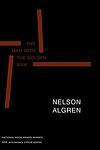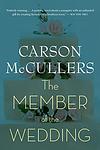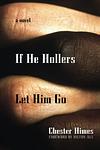The Greatest "Fiction, Social & Cultural Fiction" Books From 1940 to 1949
Click to learn how this list is calculated.
This list represents a comprehensive and trusted collection of the greatest books. Developed through a specialized algorithm, it brings together 290 'best of' book lists to form a definitive guide to the world's most acclaimed books. For those interested in how these books are chosen, additional details can be found on the rankings page.
Genres
Social & Cultural Fiction is a literary category that encompasses novels and stories that delve into the complexities of society and culture, exploring themes such as class, race, gender, and identity within specific social contexts. These narratives often provide a lens through which readers can examine the intricacies of human relationships and the impact of cultural norms and societal structures on individuals and communities. By offering a fictional yet reflective portrayal of real-world social dynamics, this genre invites readers to gain a deeper understanding of the diverse experiences that shape our world. Authors in this category frequently use their characters and settings to comment on contemporary issues, challenge prevailing ideologies, and provoke thought about the possibility of social change, making Social & Cultural Fiction a powerful tool for empathy and a mirror for the ever-evolving human condition.
Countries
Date Range
Reading Statistics
Click the button below to see how many of these books you've read!
Download
If you're interested in downloading this list as a CSV file for use in a spreadsheet application, you can easily do so by clicking the button below. Please note that to ensure a manageable file size and faster download, the CSV will include details for only the first 500 books.
Download-
1. The Stranger by Albert Camus
The narrative follows a man who, after the death of his mother, falls into a routine of indifference and emotional detachment, leading him to commit an act of violence on a sun-drenched beach. His subsequent trial becomes less about the act itself and more about his inability to conform to societal norms and expectations, ultimately exploring themes of existentialism, absurdism, and the human condition.
-
2. Native Son by Richard Wright
This novel tells the story of Bigger Thomas, a young African-American man living in Chicago's South Side during the 1930s. Bigger's life takes a tragic turn when he accidentally kills a young white woman. The incident leads to his arrest and trial, revealing the deep-seated racial prejudices and injustices prevalent in American society at the time. The narrative explores themes of poverty, systemic racism, fear, and the effects of oppression.
-
3. Under the Volcano by Malcolm Lowry
Set in Mexico on the Day of the Dead in 1938, the novel follows the last day in the life of Geoffrey Firmin, a British consul with a severe alcohol addiction. Through his interactions with his estranged wife and half-brother, the book explores themes of despair, betrayal, and the destructive power of addiction, against the backdrop of political and social unrest. The impending eruption of the nearby volcano serves as a metaphor for Firmin's deteriorating mental state and the looming world war.
-
4. The Heart Is A Lonely Hunter by Carson McCullers
The novel explores the spiritual isolation of misfits and outcasts in a small town of the U.S. South. Its protagonist is a deaf-mute who becomes the confidant for various troubled souls including a black physician, a bitter labor activist, a lonely young girl, and a struggling café owner. Each pours their heart out to him, but he remains unable to respond, reflecting the deep human need for connection and understanding.
-
5. All the King's Men by Robert Penn Warren
"All the King's Men" is a political drama that revolves around the rise and fall of a Southern governor, loosely based on Louisiana's Huey Long. The story is narrated by a journalist who becomes the governor's right-hand man, offering an inside perspective on the political machinations, corruption, and personal tragedies that accompany the governor's climb to power. The novel explores themes of power, corruption, and the moral consequences of political ambition.
-
6. Brideshead Revisited by Evelyn Waugh
The novel is a nostalgic story about the narrator's involvement with the Flyte family, British aristocrats living in a grand mansion called Brideshead. The story explores themes of faith, love, and the decline of the British aristocracy, primarily through the narrator's relationships with the family's Catholic faith and his complicated friendship with the family's son and his love for the daughter. The novel is set in the backdrop of the time period between the two World Wars.
-
7. Zorba the Greek by Nikos Kazantzakis
In this novel, a young intellectual who is immersed in books and ideas embarks on a journey with a passionate and adventurous older man named Zorba. The two men have contrasting personalities, which leads to a series of philosophical discussions and adventures. The story is set in Crete and explores themes of life, death, friendship, love, and the struggle between the physical and intellectual aspects of existence. Zorba's zest for life and his fearlessness in the face of death inspire the young man to embrace a more physical and spontaneous way of living.
-
8. Cry, the Beloved Country by Alan Paton
"Cry, the Beloved Country" is a novel about a black Anglican priest from South Africa's rural Natal region who embarks on a journey to Johannesburg in search of his sister and son. The priest grapples with the racial injustice and social inequality of apartheid-era South Africa, while his son becomes involved in political activism and is wrongfully accused of a crime. The novel explores themes of love, fear, and social justice, while highlighting the destructive effects of apartheid on the human spirit and the South African landscape.
-
9. The Power and the Glory by Graham Greene
The novel is set during the Mexican Revolution, focusing on a whisky priest who is on the run from the authorities who have outlawed Catholicism. The priest, who is flawed and sinful, travels across the country to evade capture, minister to the faithful, and find a way to repent for his sins. Despite his moral failings, the priest's compassion and commitment to his faith make him a symbol of hope and resilience in the face of oppression. The book explores themes of faith, redemption, and the human struggle with sin.
-
10. Death of Virgil by Hermann Broch
The novel explores the final hours of the Roman poet Virgil, who, while on his deathbed, contemplates the value and impact of his life's work, particularly his unfinished epic, the Aeneid. The narrative is a complex, stream-of-consciousness meditation on art, life, and death, with Virgil wrestling with his desire to burn his epic and the emperor's command to preserve it. The book delves into themes of the meaning of human existence, the role of art in society, and the clash between the individual's inner world and the external world.
-
11. The Glass Bead Game by Hermann Hesse
Set in the 23rd century, the novel revolves around a highly intellectual game, the Glass Bead Game, which incorporates all fields of human and cosmic knowledge. The story follows the life of Joseph Knecht, a scholar who becomes a Magister Ludi (Master of the Game). The book explores his life and thoughts, including his relationships with others and his questioning of the values of his society. The narrative is a profound exploration of human life, knowledge, and spirituality.
-
12. The Fountainhead by Ayn Rand
The novel presents the story of an innovative architect, who values his individualism and creativity above all else. He refuses to conform to traditional architectural designs, which leads to his struggle against a system that rewards mediocrity and conformity. Despite numerous setbacks and rejections, he remains true to his unique vision and principles. The book explores themes of objectivism, individualism, and capitalism, challenging the reader to consider the value of standing alone against the collective.
-
13. Cannery Row by John Steinbeck
Set during the Great Depression, the novel explores the lives of a community of people living in a sardine canning district on the coast of California. The narrative revolves around a group of unemployed yet resourceful men who are trying to throw a party for their friend, a marine biologist. The book is a series of vignettes, giving a detailed and humorous insight into the lives of the people in this district, their struggles, their joys, and their simple pleasures.
-
14. The Street by Ann Petry
The novel is a poignant exploration of the struggles faced by a young African American single mother living in Harlem during the 1940s. It delves into the systemic racism and sexism that constrict her life, as she endeavors to create a better future for her son amidst the poverty, violence, and oppressive social forces of the urban landscape. The narrative follows her tenacious fight against the insurmountable barriers imposed by a society that is indifferent to her dreams and her dignity, painting a vivid portrait of resilience and the human spirit's quest for freedom.
-
15. The Bridge on the Drina by Ivo Andrić
"The Bridge on the Drina" is a historical novel that spans four centuries, highlighting the lives and experiences of the inhabitants of a small town in Bosnia. The narrative revolves around a stone bridge, which serves as a symbol of unity and continuity. The book explores the impact of the Ottoman Empire, the Austro-Hungarian Empire, and the onset of World War I on the multicultural community living in the town, capturing the changes, conflicts, and resilience of the people and their cultures.
-
16. The Man with the Golden Arm by Nelson Algren
"The Man with the Golden Arm" is a novel that tells the story of Frankie Machine, a talented card dealer and drummer in post-World War II Chicago who becomes addicted to morphine. The narrative vividly portrays his descent into addiction and his struggles with poverty and crime, while also exploring themes of despair, corruption, and redemption. The book is notable for its gritty depiction of life in the urban underbelly and its nuanced characterizations.
-
17. The Member Of The Wedding by Carson McCullers
The novel centers around the life of a young girl named Frankie Addams who struggles with feelings of isolation and disconnection in her small Southern town. As she grapples with the complexities of adolescence, Frankie becomes obsessed with her older brother's upcoming wedding, seeing it as an opportunity to belong and escape her lonely existence. Her desire to be included in the "we" of her brother and his fiancée leads her to a series of poignant realizations about identity, belonging, and the pains of growing up. Set against the backdrop of World War II, the narrative explores themes of love, loss, and the search for personal significance.
-
18. The Slaves of Solitude by Patrick Hamilton
Set in England during World War II, the novel follows a middle-aged woman living in a boarding house, who spends her time navigating the petty squabbles and politics of her fellow residents. Her life takes a turn when she becomes entangled in a love triangle with a charming but manipulative American lieutenant and a young German woman. The book explores themes of loneliness, manipulation, and the struggle for personal freedom in a time of national crisis.
-
19. The Hamlet by William Faulkner
"The Hamlet" is a complex narrative that explores the lives of the Snopes family, their rise to power, and their struggle with morality in a small southern town. The story is filled with themes of greed, manipulation, and the quest for power, as the Snopes family uses cunning and deceit to gain control over the town and its inhabitants. The novel is a vivid portrayal of the dark side of human nature and the destructive power of ambition.
-
20. All about H. Hatterr by G. V. Desani
This novel is a unique blend of Eastern philosophy and Western literary technique, following the adventures of its protagonist, a British-educated Indian everyman, as he navigates the complexities of life. The narrative is filled with humor, satire, and linguistic playfulness, as the protagonist interacts with various eccentric characters and experiences numerous absurd situations. The book is a critique of both British colonialism and traditional Indian society, offering a distinctive and insightful perspective on the human condition.
-
21. This Way for the Gas, Ladies and Gentlemen by Tadeusz Borowski
This book is a collection of short stories based on the author's experiences as a prisoner in Auschwitz during the Holocaust. Each story provides a harrowing, yet matter-of-fact, account of life in the concentration camp, from the brutal work details to the constant threat of death. The author's stark and unflinching portrayal of the horrors of Auschwitz serves as a powerful testament to the human capacity for survival and resilience in the face of unimaginable cruelty.
-
22. Strange Fruit by Lillian Smith
"Strange Fruit" is a controversial novel set in the 1920s South, which explores the tragic consequences of a forbidden interracial relationship between a white man and a black woman. The narrative delves into the deeply ingrained racial prejudice, hypocrisy, and societal norms of the era, leading to a tragic end for the couple. The book is a powerful indictment of racism and a plea for understanding and change.
-
23. Midaq Alley by Najib Mahfuz
Set in an old Cairo neighborhood during World War II, the novel delves into the lives of the residents of a bustling alley, offering a tapestry of human experiences and social issues. Through the stories of a diverse cast of characters, including a young beauty dreaming of a better life, a wealthy businessman seeking love, a cafe owner yearning for his past, and others, the narrative explores themes of love, ambition, and the struggle for personal fulfillment. The alley serves as a microcosm of society, reflecting the larger cultural and political changes occurring in Egypt at the time, and the characters' intertwined lives illustrate the complexities of human nature and the universal quest for happiness and meaning.
-
24. The Golden Apples by Eudora Welty
"The Golden Apples" is a collection of interconnected short stories set in the fictional town of Morgana, Mississippi. The narratives follow various characters at different stages of their lives, providing a comprehensive picture of the town and its inhabitants. The stories are rich with symbolism and explore themes like love, loss, and the passage of time, all against the backdrop of Southern life and culture.
-
25. If He Hollers Let Him Go by Chester Himes
Set in Los Angeles during World War II, the novel follows the life of an African-American shipyard worker who is battling racial tensions and discrimination. The protagonist, constantly living in fear of being falsely accused of a crime because of his race, is also dealing with a complicated relationship with a white woman, further complicating his life. The book explores the themes of race, class, and the psychological effects of racism and discrimination.
Reading Statistics
Click the button below to see how many of these books you've read!
Download
If you're interested in downloading this list as a CSV file for use in a spreadsheet application, you can easily do so by clicking the button below. Please note that to ensure a manageable file size and faster download, the CSV will include details for only the first 500 books.
Download






















